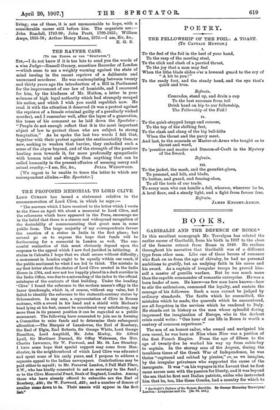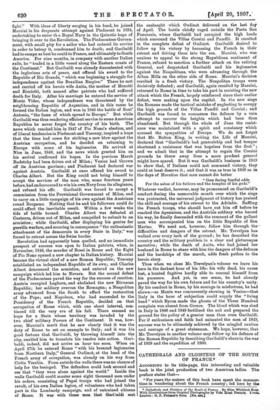BOOKS.
GARIBALDI AND THE DEFENCE OF ROME.* IN this excellent monograph Mr. Trevelyan has related the earlier career of Garibaldi, from his birth in 1807 to the close of the famous retreat from Rome in 1849. He realises throughout his narrative that Garibaldi was of a different type from other men. Like one of those heroes of romance who flash on us from the age of chivalry, he had no personal ambitions to gratify, but an undying faith in his cause and his sword. As a captain of irregular troops he proved him- self a master of guerilla warfare. But he was much more than the capable commander of romantic enterprise. He was a, born leader of men. He knew—as few men have known—how to stir the enthusiasm, command the loyalty, and sustain the courage of his followers. Such a man cannot be judged by ordinary standards. The faults which he committed, the mistakes which he made, the quarrels which he encountered, are all forgotten in the services which he rendered to Italy. He stands out in history as the man whose splendid daring impressed the imagination of Europe, who in the darkest crisis could write : " One hour of our life in Rome is worth a century of common experience."
The son of an honest sailor, who owned and navigated his own vessel, he was born at Nice when Nice was a portion of the first French Empire. From the age of fifteen to the age of twenty-five he worked his way up from cabin-boy to captain. In the stormy seas of the Aegean, during the troublous times of the Greek War of Independence, he was thrice "captured and robbed by pirates," or, as we imagine. by the irregular privateers who supported the cause of the insurgents. It was "on his voyages in the Levant that he first came across men with the passion for liberty, and it was beyond theses that he first met Italian patriots, exiles who instructed him that he, too, like these Greeks, had a country for which to
• Goreoldg. Wows qt 5. Boman Hosblio. By George RI•e•ol•Y TrevelYare Loudon, Lougmass and Co. [Si. 8d. set]
fight." With ideas of liberty surging in his bead, he joined Mazzini in his desperate attempt against Piedmont in 1834, undertaking to enter the Royal Navy in the Quixotic hope of bringing it over to the Revolution. The Piedmontese Govern- ment, with small pity for a sailor who had entered its service in order to betray it, condemned him to death; and Garibaldi Lad to escape as best he could to France, and ultimately to South America. For nine months, in company with another Italian exile, he "traded in a little vessel along the Eastern coasts of the Continent." But Garibaldi was already discontented with the inglorious arts of peace, and offered his sword to the Republic of Rio Grande, "which was beginning a struggle for independence against the Brazilian Empire." There he met and carried off his heroin wife Anita, the mother of Menotti and Ricciotti, both named after patriots who had suffered death for Italy. After his marriage he entered the service of Monte Video, whose independence was threatened by the neighbouring Republic of Argentina, and in this cause be formed the Italian legion, and won in 1846 the battle of Sant' Antonio, "the fame of which spread to Europe." But while Garibaldi was thus rendering efficient service to some American Republics he never forgot the country of his birth. The news which reached him in 1847 of Pio Nono's election, and of liberal tendencies in Piedmont and Tuscany, inspired a hope that the time had come for striking a new blow against the Austrian occupation, and he decided on returning to Europe with some of his legionaries. He arrived at Nice in June, 1848, and the news which greeted him on his arrival confirmed his hopes. In the previous March Radetzky had been driven out of Milan; Venice had thrown off its Austrian garrison ; and Piedmont had declared war against Austria. Garibaldi at once offered his sword to Charles Albert. But the King could not bring himself to accept the services of the man who, sorae fourteen years before, bad ende,avoured to win his own Navy from its allegiance, and refused his offe. Garibaldi was forced to accept a commission from the Provisional Government of Milan, and to carry on a little campaign of his own against the Austrians round Bergamo. Nothing that he and his followers could do could affect the inevitable result. Within a few weeks the tide of battle turned. Charles Albert was defeated at Custozza, driven out of Milan, and compelled to submit to an armistice ; while Garibaldi, after displaying his genius for guerilla warfare, and securing in consequence "the enthusiastic attachment of the democrats in every State in Italy," was forced to retreat across the Swiss border.
Revolution had apparently been quelled, and no immediate prospect of success was open to Italian patriots, when, in November, 1848, the murder of Rossi in Rome and the flight of Pio Nono opened a new chapter in Italian history. Mazzini became the virtual chief of a new Roman Republic ; Tuscany established an independent Republic of its own; and Charles Albert denounced the armistice, and entered on the new campaign which led him to Novara. But the second defeat of the Piedmontese paved the way for the success of reaction. Austria occupied Leghorn, and abolished the new Etruscan Republic; her soldiery overran the Romagna ; a Neapolitan army advanced from the South to effect the restoration of the Pope; and Napoleon, who had succeeded to the Presidency of the French Republic, decided on that occupation of Rome which, with one short interval, con- tinued till the very eve of his falL There seemed no hope for a State whose territory was invaded by the two chief military Powers of the Continent. It was, how- ever, Mazzini's merit that he saw clearly that it was the duty of Rome to set an example to Italy; and it was his good fortune that Garibaldi, by throwing himself into the city, enabled him to translate his resolve into action. Gari- baldi, indeed, did not arrive an hour too soon. When on April 27th he entered Rome "with his bronzed legionaries from Northern Italy," General Oudinot, at the head of the French army of occupation, was already on his way from Civita Vecchia. From outside the walls there was no chance of help for the besieged. The defenders could look around and see that "they were alone against the world." Inside the walls Garibaldi could muster some eight thousand men under his orders, consisting of Papal troops who had joined the revolt, of his own Italian legion, of volunteers who had taken .part in the Lombardy campaign, and of untrained citizens of Rome. It was with these men that Geri:midi met
the onslaught which Oudinot delivered on the last day of ApriL The battle chiefly raged outside the Porte San Pancrazio, where Garibaldi had occupied the high lands which surround the Villas Corsini and Pamffii. It resulted in the complete defeat of Oudinot. Garibaldi desired to follow up his victory by harassing the French in their retreat and driving them into the sea. Mazzini, who was anxious to appeal to the strong Republican sentiment of France, refused to sanction a further attack on the retiring General, and despatched Garibaldi and his legionaries against the Neapolitans, who were advancing through the Alban Hills on the other side of Rome. Mazzini's decision resulted in a fresh victory. The Neapolitan troops were decisively defeated; and Garibaldi, again recalled by Mazzini, returned to Rome in time to take his part in resisting the new attack which the French, largely reinforced since their earlier defeat, were making upon the capital. In the new siege the Romans made the tactical mistake of neglecting to occupy the high grounds of the Villas Pamfili and Corsini ; and Garibaldi was forced to commence the defence by a vain attempt to recover the heights which had been thus abandoned. But through the whole of Jane the resist- ance was maintained with a spirit and constancy which aroused the sympathies of Europe. We do not forget that Mr. Bolton Bing, in writing the Life of Mazzini, declared that "Garibaldi's bad generalship and bad temper shortened a resistance that was hopeless from the first" ; and we admit that in the attempt to regain the Corsini grounds he threw away lives a more prudent general might have spared. But it was Garibaldi's business in 1849 to show that, if Italians could not command victory, they could at least deserve it ; and that it was as true in 1849 as in the days of Horatius that man cannot die better
"than facing fearful odds
For the ashes of his fathers and the temples of his gods." Whatever verdict, however, may be pronounced on Garibaldi's conduct during the memorable month over which the siege was protracted, the universal judgment of history has praised the skill and courage of his retreat to the Adriatic. Baffling the French troops, who should have cut him off before be reached the Apennines, and the Austrian soldiery who barred his way, he finally descended with the remnant of the gallant men who accompanied him on the little Republic of San Marino. We need not, however, follow him through the- difficulties and dangers of the retreat. Mr. Trevelyan has walked over every inch of the ground; he has described the country and the military problem in a clear and picturesque narrative; while the death of Anita, who had joined her husband in Rome to share with him the dangers of the defence and the hardships of the march, adds fresh pathos to the heroic story.
Thus when we close Mr. Trevelyan's volume we leave his hero in the darkest hour of his life : his wife dead, his cause lost, a hunted fugitive hardly able to conceal himself from his pursuers. And yet, in one sense, he had already paved the way for his own future and for his country's unity. By his conduct in Rome, by his courage in misfortune, he had shown—as Manin was concurrently showing in Venice—that Italy in the hour of subjection could supply the "living head" which Byron made the ghosts of the Three Hundred complain was absent from Greece. The blood which was shed in Italy in 1848 and 1849 fertilised the soil and prepared the ground for the policy of a greater man than even Garibaldi. For if enthusiasm and faith had animated the men of 1849, success was to be ultimately achieved by the mingled caution and courage of a great statesman. We hope, however, that Mr. Trevelyan in another volume may follow up his defence of the Roman Republic by describing Garibaldi's share in the war of 1859 and the expedition of 1860.











































 Previous page
Previous page